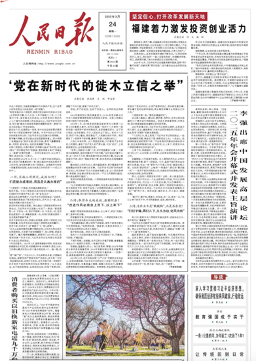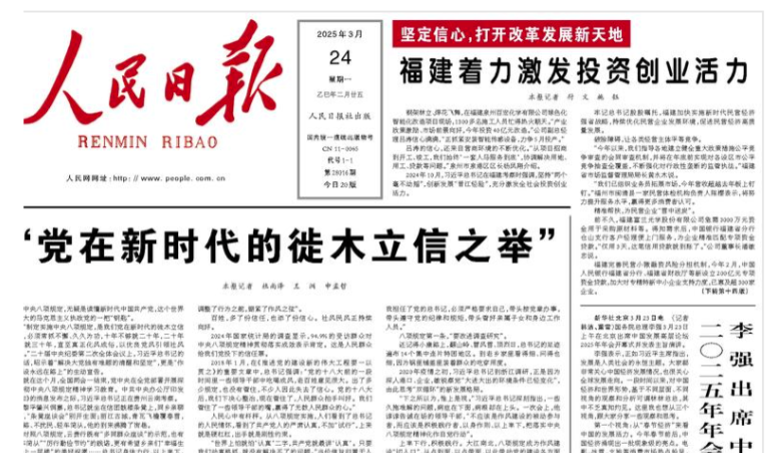On the Eight-Point Directive introduced by the Political Bureau of the CPC Central Committee.
On the Eight-Point Directive introduced by the Political Bureau of the CPC Central Committee.
By Adnan Akfırat, Chairman of the Turkish-Chinese Business Development and Friendship Association
All newspapers in Turkiye on March 24, 2025, reported on their front pages the arrest of Istanbul Metropolitan Mayor Imamoglu for corruption. On the very same day, the headline of China’s “People’s Daily” newspaper summarized the gains of China’s “8-Point Regulation”, which started 13 years ago to fight corruption and bureaucracy.
The People’s Daily is the official voice of the Chinese Communist Party. It is the only newspaper published in the whole of China, which is the size of a continent. It is printed 3 million copies a day. Since 1997, it has been published digitally. With the digital edition, its total readership is reported to be over 100 million. (1) According to UNESCO, it is among the top 10 best-selling newspapers in the world. People’s Daily is the “flagship” of Chinese media.

The article titled “The Party’s Push for a New Era” is signed by three senior reporters of the newspaper. (2) The article begins as follows: “The Eight-Point Directive was introduced by the Political Bureau of the CPC Central Committee in December 2012 to improve working style, reduce bureaucracy, combat extravagance among Party and government officials, and restore public trust in the Party and the state.”
What are the 8 points?
The most common Chinese tradition is abbreviations. When they say “8 Points”, everyone easily understands and starts counting. Let’s take a closer look at these “8 Corrections” that have been put in place to bring order to the state and the Party.
The CPC Central Committee’s “Eight-Point Directive” to Party and state cadres includes the following:
“1. Improve investigation and research
Grassroots reviews and audits should focus on real conditions, avoiding superficiality and formalism.
“2. Reduce meetings and increase efficiency
Reduce unnecessary meetings, limit scale/duration and increase effectiveness.
“3. Reduce unnecessary document filling and briefings
Minimize paperwork, advocate and practice concise and factual report writing.
“4. Standardize official visits abroad
Strictly limit participants and simplify welcome protocols.
“5. Improve security arrangements
Reduce traffic controls when leaders pass; prohibit road closures or closures of public places.
“6. Improve news coverage and content
Simplify and avoid enlarging coverage of official meetings/leaders’ activities and ensure that the media focus on people’s livelihoods.
“7. Exercise strict control over party and state publications
Do not allow unauthorized publication of books or speeches by leaders.
“8. Practice frugality very strictly
Strictly enforce rules on housing, vehicles and social benefits for party and state leaders; oppose extravagance.” (3)
The key to understanding China’s new era
The article in the People’s Daily says that the “Eight-Point Guidelines” are a “key” to understanding the “new era” proclaimed by the Chinese Communist Party, the world’s largest Marxist ruling party. It notes that these regulations are the first major Party document formulated in the New Era of China-Specific Socialism and were agreed upon at the Political Bureau meeting on December 4, 2012, immediately after the 18th Congress, when Xi Jinping was elected CPC Secretary.
The first part of the article summarizes the results of the implementation of the directive and describes how the Directive serves as a “golden calling card” for the Chinese Communists in the new era.
Let the rulers be uncomfortable, people be relaxed!
At the Political Bureau meeting where the Eight-Point Directive was approved, General Secretary Xi Jinping said: “We have to be a little uncomfortable, we have to be a little less comfortable. But if we become uncomfortable, people’s comfort will increase and their satisfaction will rise.”
In March 2014, a year after the eight-point regulation was introduced, General Secretary Xi Jinping is quoted as emphasizing at a county party meeting in Henan province: “Tigers, flies, foxes… No matter who they are, no matter how high their position, as long as they violate Party discipline and state rules, they will definitely be held responsible and severely punished.”
The article cites a survey conducted by China’s National Bureau of Statistics in 2024, which found that 94.9% of the people had adopted the “8-Point Guideline”. This result is interpreted as “the people’s vote of confidence in the Party”.
President queues for food with soldiers
In the next chapter, the focus on the top executives who are decisive for change, starting with the central leadership, is very much on target.
The great example given at the outset is Xi Jinping’s simplicity: “On his first inspection trip after the 18th Party Congress in 2012, the General Secretary went to Guangdong and inspected the roads without paving them, without blocking traffic, without rolling out red carpets.
“On the same trip, when the General Secretary was inspecting military units, on a warship, he went to the sailors’ canteen for a meal, lined up with the soldiers with a tray, and ate at the same table with them.” The article describes this action as follows: “What is served in the rice bowl is the heart of the Party and the heart of the people.”
Referring to the receipts Xi Jinping collects for expenses on his trips, the article lists the following examples of “here is the daily life of a leader”: “The dinner menu for an inspection in Fuping County, Hebei, in 2012, the meal receipt for an inspection in Lankao County, Henan, in 2014, and the lunch receipt at Liang Yuming’s village house in Liangjiahe in 2015… Four dishes and a soup, all ordinary home cooking.”
Should we take a break?
In the third chapter, the authors ask the question: Now that such great results have been achieved, can’t we take a break from this campaign? The answer is as follows:
“Since the 20th Party Congress, national disciplinary and supervisory bodies have investigated and handled 768,000 cases of unhealthy practices and corruption among the masses and punished 628,000 people. Another 20,000 people have been referred to prosecution bodies. Particularly strong measures have been taken in key areas such as health, education and rural affairs. China’s fight against corruption aims to eliminate both ‘flies’ and ‘tigers’. The ‘flies’ represent low-ranking officials, while the ‘tigers’ represent those in high positions in the state and the Party. In 2024, 58 ‘tigers’ were captured, the highest number in a decade. Tracking down those who fled abroad due to corruption investigations, China extradited 1,306 people from abroad and recovered illegal assets totaling $2.1 billion between January and November 2024. Since the 20th Congress of the CPC, both bribe-takers and bribe-givers, even those who witnessed bribery and kept silent, have been punished.”
“Corruption and breach of discipline cannot be treated like a passing wind. The Secretary General has many vivid metaphors: ‘There are always places where flashlights cannot illuminate!” What to do? During this trip to Yunnan and Guizhou, the Secretary-General again provided methodological guidance: ‘Looking inward, problems in working style often start with ideological drift. Just as a room needs to be cleaned regularly, thoughts must be constantly purified. When righteousness dwells in man, evil cannot encroach upon it. Only by developing the ‘inner discipline’ of a Communist Party member can we radically achieve the state of ‘not wanting to be corrupted at all costs’.”
The article emphasizes that this struggle must continue over a long historical period, saying:
“Consciousness is the root and the way of working is the form. If the root stands upright, the form will recover; if the root does not stand upright, the form will surely fall apart. Continue to deepen the fight against formalism to reduce the burden on rank-and-file cadres and let rank-and-file cadres enter the battle with their bodies. In the past it was more about asking the masses to do things, but now it is more about Party members and cadres doing things and serving the masses.
“The Party style is leading Party and state cadres to be kind, frugal and economical, not ostentatious, and fundamental socialist values are becoming increasingly important and deeply rooted in people’s consciousness and hearts.”
13 Years of great progress
Outsiders are asking: “Was an anti-corruption campaign of this scale and scope necessary in China?” The Western press often claims that the “Xi Jinping clique” used this campaign to eliminate its rivals.
However, during the period of the “Opening Up and Reform,” the Chinese nature polluted had also polluted human beings. China has recently made significant progress in environmental protection. To address the pollution of consciousness, an undeclared cultural revolution is taking place in China under the leadership of Xi Jinping through the state and Party cadres. This is what it is all about.
It is essential to recall the words of our revolutionary prophet Muhammad: “Statesmen should die poor so that the nations they govern will be rich and happy. If statesmen try to fill their pockets, the nation will be poor and miserable, and the cause will be defeated.” (4)
Footnotes:
- http://en.people.cn/other/about.shtml
- http://paper.people.com.cn/rmrb/pc/content/202503/24/content_30063630.html?utm
- https://www.chinadaily.com.cn/china/19thcpcnationalcongress/2012-12/05/content_32194137.htm
- As cited in Mahmut Esat Bozkurt, Atatürk İhtilali I-II, Kaynak Publications, revised fourth edition, April 2003, p. 66.

















Leave a Reply